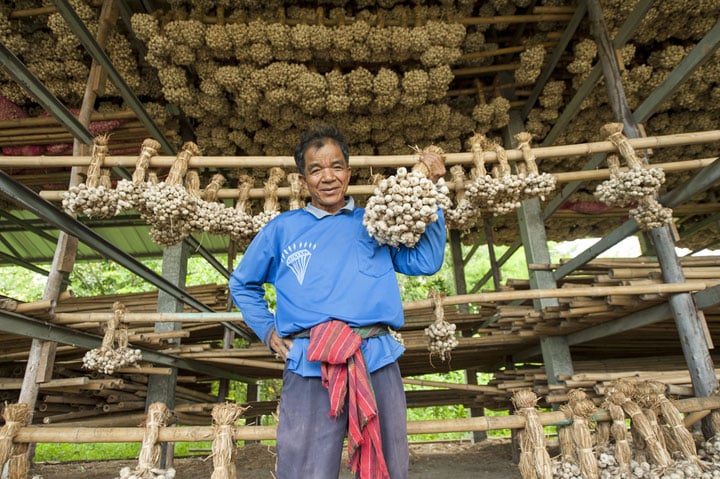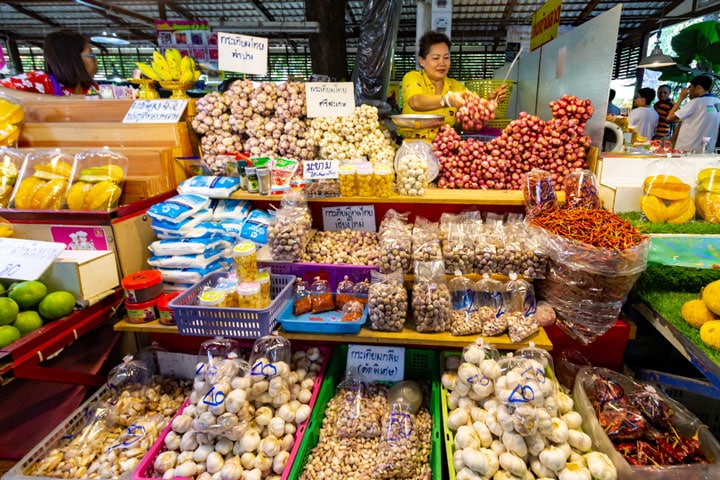Garlic in Thailand

Garlic farmer in Sisaket (Stasis Photo / Shutterstock.com)
When my grandmother passed away a long, long time ago, my grandfather was lovingly welcomed into our family. That was still the case at the time, because sheltered housing or care flats did not yet exist.
I didn't like him, because now as a toddler I not only had to listen to my parents, but also to him. I never saw him smile, just always that gruff face. Plus, he had some weird habits.
For example, he smoked cigars, those long matted stink sticks. He first cut about a third off and used it as chewing tobacco. Later he would smoke another third of the cigar and finally crumple the remainder into his pipe. He reeked not only of cigars, but also of garlic.
Every morning my mother prepared some kind of cocktail for him, a big bubble of (Dutch) cognac with a raw egg in it and two cloves of garlic. Gosh, I thought that was gross. When he had ground that garlic with his dentures, a horrible smell came out of his mouth, so that I preferred to stay far away from him.
Now I live in Thailand, am an avid cigar smoker and fond of garlic dishes. I was also named after that grandfather, so maybe I have more (bad) qualities from him.

(Sombat Muycheen / Shutterstock.com)
Asian guests
We won't talk about cigars, but I slowly but surely became familiar with garlic. My first acquaintance must have been with the Navy, where garlic was undoubtedly incorporated into the traditional Indonesian dishes of rice table and nasi goreng. I became aware of eating garlic when I was newly married. Because of my work I often received mainly Asian, including Thai guests, with whom I went out for dinner in the evening. There were no Thai restaurants yet, so it was usually a Chinese or Indonesian restaurant. When I got home, I was kindly but firmly requested to spend the night in the guest room, because the stench from my mouth was unbearable.
Odor
Later my wife became a specialist in Chinese and Indonesian cuisine herself and garlic was used extensively in all kinds of dishes. If you eat garlic both or together with others, you will of course not be bothered by that stench from your mouth. You know that the unpleasant odor is caused by the odorless substance alliin (S-allyl-L-cysteine sulfoxide). This substance is released as soon as the cell tissue is damaged, so as soon as you cut the garlic. At that moment it enters into a connection with the enzyme alliinase that is separated from alliin in the cell tissue and Allicin (diallyl thiosulfinate) is formed. Allicin is a very unstable substance and is directly converted into more than a hundred active (volatile) metabolites (thiosulfinates). These metabolites cause the sometimes annoying garlic smell. So, we have now also scientifically explained that.
Thai dishes
Garlic is widely used in almost all countries today, including Thailand. Thai dishes without garlic, "krathiem", are almost unthinkable. It is eaten raw, cooked as a spice or eaten marinated, many variations are possible. When "khao ka moo" (braised pork leg with rice in Chinese style) is eaten, small cloves of fresh garlic are included. These fresh cloves also belong to “larb”, a dish made with minced meat. A popular dish is also "thawt krathiem prik Thai", which can be made with different types of meat, fish or shrimp. It is a marinade dish, in which (a lot of) garlic should not be missing. Crispy fried garlic is sprinkled on Thai snacks, such as “Sakhu sai moo” (minced pork mixed with palm sugar, spices and crushed peanuts, baked in tapioca leaves). Variations on this are “khao kriab pak muil”, (the same pork mixture wrapped in thin sheets of rice flour batter and the Chinese “khanom jeep”, (thin wheat noodles mixed with pork and shrimp). None of these three dishes can be made without garlic.

Garlic variants
Two types of garlic are used in Thailand. In the first place the "krathiem Thai", (Thai garlic), a type with small balls and therefore also small cloves. It is grown in the north, Lamphun, Chiang Mai, Lampang and Chang Rai and in Isan, where Si Sa Ket is famous for garlic cultivation. Thai garlic has a warm, strong flavor and a pungent smell. Cutting those little cloves isn't easy and takes quite a bit of time in preparation. The Chinese garlic is much larger and therefore easier to cut. It is also cheaper than Thai garlic and can also be stored for longer. The downside was Chinese garlic, which lacks the intense flavor and aroma of Thai garlic. Demanding chefs adhere strictly to Thai garlic, but Chinese garlic is used in many restaurants for economic and practical reasons22
Things worth knowing
There is a lot more to tell about (the use of) garlic. I recommend a very nice website about this www.garlic.nl where the origin, use, recipes, etc. are nicely described. As for health, my grandfather never saw that website, but he did know that the use of garlic lowers cholesterol and blood pressure. A nice section is also the music, in which the garlic is applauded. I especially enjoyed the excerpt Knoblauch from the musical “Tanz der Vampire”:
Finally,
In many Western restaurants there is a tuft of parsley on your plate as a garnish. Eat it, chew it well and the smell of garlic is largely neutralized.
Text from the garlic.nl website and from a recent article in the Bangkok Post were used.


Garlic may have unpleasant odors, but it is indeed very healthy. I even give it to my dog, ideal against fleas and ticks.
What may be healthy for a human does not mean the same for an animal. Giving garlic to a dog can lead to anemia. It makes Heinz blood cells, which causes the healthy red blood cells to be broken down.
Giving your dog garlic is an effective way to give him/her an early death.
Garlic is super healthy, 4 cloves pure every day is super good for the heart and blood vessels, in addition to the large amounts of garlic used in daily food, I also eat 4 pure cloves, no bullshit here like in Flanders, you stink of the garlic, because Everyone here eats a lot of garlic, which means we can't smell it from each other. It's up to the internet to find out how and how much to achieve a healthy effect on the body, preferably pure.
Gringo writes an article after my own heart !!!!!!
I eat a lot of garlic in all kinds of variations every day…
Cooking is one of my hobbies and garlic is always part of it. Even if I have one
Dutch dish such as hutspot (also with curry) hachee and various soups.
And of course nassi and bami goreng the Thai way.
And especially meat and chicken dishes.
Gerrit
I myself have encountered garlic here in the Isaan that is almost as sharp as the hot peppers. If you put one of these in your mouth and you're not aware of it, you'll be knocked back, that's how hot it is.
I find the garlic that you can buy here, and that is usually the Chinese imported, not nearly as strong, and therefore less tasty, as the Western garlic. I therefore also brought garlic and planted the cloves here. Unfortunately, I had not taken the heat into account and the plants burned after emergence. Better luck next time. Now we have also bought that small Thai garlic and it is already a lot better, but you can indeed store it for less time. We use it in almost all our dishes… delicious.
I don't think Thai chefs and mothers use garlic excessively, but rather very subtly. I have never eaten a dish where you could say that excessive garlic was used, such as in the garlic sauce in the Netherlands, to name a few. Not even with my Thai mother-in-law and aunts where I have eaten many times over the years.
A third variant: Kratiem Toon. Are balls like pickled onions, so no cloves! Very hard to find and too expensive for the Thai, but so much tastier! We used to bring them when they were there from Pattaya (90s) years from Phuket through the Muslim community otherwise not to be found!!
That 'Kratiem Toon' I can do here in Pathiu, Saphli…. just buy it on the market and it is not expensive at all. In Phuket it will be different, everything is more expensive there than elsewhere. This Thai look is much stronger than the Chinese…. It's a bit of a mess to clean those little balls.
Some Farang dishes do require garlic, including lamb, but I don't make excessive use of it myself and certainly don't just eat garlic every day.
Recently I watched the Netflix documentary Rotten, in particular Garlic Breath. It is about, among other things, the unfair competition and the use of many pesticides that are used in the production of Chinese garlic. So there appears to be a bad smell. We prefer to buy the Thai and French variants. We like the air you get from that better. 😉
Hardly anything general can be said about the correct dosage of garlic and onions. Indeed, some prefer to dose the garlic subtly. We have tried it in cooking courses. For example, a dressing or pasta dish without and an identical dish with very little garlic (which had been freshly rubbed with a little salt). In that case, the typical taste of the garlic can no longer be perceived, but "connects" all other aromas in the dish. It tastes "rounded".
However, there are also dishes that are mentioned above, which can really taste like garlic.
Personally, I don't like kitchens that use onions and garlic as easy condiments in large quantities and everything tastes like garlic and onions.
Incidentally, onions and garlic are hardly used in Ayurvedic cuisine because the strong taste and smell, according to the Ayurvedic view, impairs the sense of taste and clouds the mind. Instead, asafoetida (Inguva, Kayam, Hing) is commonly used mixed with fenugreek (methi). The therapeutic possibilities, on the other hand, are certainly seen in Ayurvedic medicine.
https://www.msn.com/en-in/health/health-news/black-garlic-health-benefits-you-must-know/ar-AAGkOqg
This one is a completely different variant, very healthy.
We eat 2 cloves of it every day after breakfast, it is quite expensive but I now make it myself in an old rice cooker.
About dogs, fleas and garlic, my friend Claire, who has worked as a veterinarian for 40 years, says the following:
I know people who always give their dogs garlic and they say they don't have fleas.
Yet I also see dogs eating garlic with fleas.
I once saw cows that had eaten onions with enormous anemia, but they had also eaten an awful lot of onions.
I would have to look up what the situation is with Heinz bodies .
I always buy the big garlics. Those little ones are too much work for me. What strikes me, however, is that the garlic never sprouts. And it is precisely those germinated garlics that are much healthier according to various websites that I have consulted. The onions I buy here also never germinate. They do have a longer shelf life.
Before this I lived in China and there the garlic and onions germinated quite quickly. So they were always nice and fresh in my opinion. In Thailand so less I think. I think those garlics and onions here go through a process to prevent them from sprouting. But is that really healthy?
Thai farmers face even more problems, as I read this morning:
Thai garlic farmers suffer as cheaper Chinese bulbs flooded the market